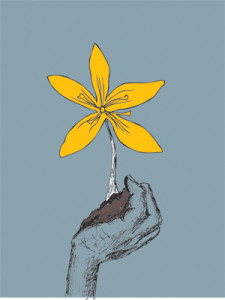Just being alive means having to face many beginnings and endings. Depending on how we handle them, both can offer us important life lessons. Since most of us have a natural instinct to avoid dealing with death, it’s no wonder that we often resort to fight-or-flight responses when we’re faced with endings and losses.
Clearly, some of us face endings more easily than others. And having strong coping mechanisms certainly helps us to fully embrace endings. At the same time, others avoid endings altogether by resorting to the “flight mode.”
In my private practice, I’ve seen this happen when a client cancels his or her last appointment to avoid saying good-bye. In this case, a full completion experience is missed—both the celebratory aspect of accomplishment, as well as the sadness that can come from closing a chapter of emotional connectedness and support.
Another way of avoiding the vulnerability of an ending is by going into the “fight mode.” Either way, avoidance keeps us from the completion that often comes from embracing the full cycle. And, the positive side of avoidance is when it is experienced as nature’s way of protecting us from being completely overwhelmed by a loss—when we simply aren’t able to handle the extent of the trauma all at once. Then, thankfully, our own natural defenses come forward to let us process the feelings at our own pace.
For example, Laura’s “fight response” to her younger brother’s unexpected death in an auto accident was to stay angry for years. Filled with blame and rage, she thought of every way that her brother “could’ve” and “should’ve” avoided the accident. During that time she simply wasn’t strong enough to accept this horrific loss and embrace her vulnerability. As a result, she withdrew from her friends and her previously active social life.
Eventually, after being nudged by concerned family members, she sought help. With support, Laura was ready to let go of her anger and deal with her loss. Her emotional floodgates opened only when she was able to face her brother’s tragic death. By embracing the various stages of the grief cycle, she was finally able to make peace with her brother and herself. By courageously facing this painful ending, eventually she was able to open to life again.
In my private practice, I sometimes hold the flashlight for clients who are embracing losses. A small book I often recommend is, How to Survive the Loss of a Love, by Harold Bloomfield, M.D., Melba Colgrove, Ph.D., and Peter McWilliams. This book guides readers through three stages of recovery:
– Shock/Denial/Numbness
– Fear/Anger/Depression
– Understanding/Acceptance/Moving On
How to Survive the Loss of a Love, refers to many types of losses and describes what loss feels like. For example, it clarifies how losses can be either subtle or dramatic. Obvious losses include the death of someone you love (including a pet), separation, divorce, or the end of an affair. Less obvious losses include the loss of a job, health, teachers, schools, safety (after being burglarized or attacked), money, friends, or even the loss of an important dream. In addition, there are losses that are related to the aging process, which include loss of youth, mental acuity, attractiveness, hair, sex drive, and loss of work upon retirement.
Oh, the complex task of being human; births and deaths, joys and sorrows filling our years. I say, thank goodness we can find other folks to paddle with as we navigate these ever-changing waters we call life.
And, that just for today we make time to appreciate the moment, our loved ones, and the glorious fresh air that surrounds us. By honoring the mystery of it all and finding meaning…we embrace the beginnings, endings, and all the precious juice in between.
Name and client details changed for confidentiality.
————-
Save the Date: Attend Trina’s workshop for women and men— Managing Emotional and Compulsive Eating—at John Muir Women’s Health Center in Walnut Creek: Wednesday, Oct 16, 6:30-8:30 pm. Cost: $40 (Includes Weight Loss: 2-CD set). Seats are limited—register today for this inspiring workshop: (925) 941-7900 option 3. For more info, go to www.TrinaSwerdlow.com & click on “Private Sessions & Workshops.”
—————
Trina Swerdlow, BFA, CCHT, is a Certified Clinical Hypnotherapist, an artist, and the author and illustrator of Stress Reduction Journal: Meditate and Journal Your Way to Better Health. Trina has a private practice in downtown Danville. You can reach her at: (925) 285.5759, or info@TrinaSwerdlow.com.
Certified Clinical Hypnotherapy services in California can be alternative or complementary to licensed healing arts, such as psychotherapy.
Leave a Reply